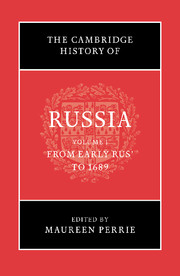Book contents
- Frontmatter
- 1 Introduction
- 2 Russia’s geographical environment
- Part I Early Rus’ and the Rise of Muscovy (c. 900–1462)
- Part II The Expansion, Consolidation and Crisis of Muscovy (1462–1613)
- 9 The Growth of Muscovy (1462–1533)
- 10 Ivan IV (1533–1584)
- 11 Fedor Ivanovich and Boris Godunov (1584–1605)
- 12 The Peasantry
- 13 Towns and commerce
- 14 The non-Christian peoples on the Muscovite frontiers
- 15 The Orthodox Church
- 16 The law
- 17 Political ideas and rituals
- 18 The Time of Troubles (1603–1613)
- Part III Russia Under the First Romanovs (1613–1689)
- Bibliography
- Index
- Plate section"
- Plate section"
- References
15 - The Orthodox Church
from Part II - The Expansion, Consolidation and Crisis of Muscovy (1462–1613)
Published online by Cambridge University Press: 28 March 2008
- Frontmatter
- 1 Introduction
- 2 Russia’s geographical environment
- Part I Early Rus’ and the Rise of Muscovy (c. 900–1462)
- Part II The Expansion, Consolidation and Crisis of Muscovy (1462–1613)
- 9 The Growth of Muscovy (1462–1533)
- 10 Ivan IV (1533–1584)
- 11 Fedor Ivanovich and Boris Godunov (1584–1605)
- 12 The Peasantry
- 13 Towns and commerce
- 14 The non-Christian peoples on the Muscovite frontiers
- 15 The Orthodox Church
- 16 The law
- 17 Political ideas and rituals
- 18 The Time of Troubles (1603–1613)
- Part III Russia Under the First Romanovs (1613–1689)
- Bibliography
- Index
- Plate section"
- Plate section"
- References
Summary
In 1448 Grand Prince Vasilii II of Moscow and a council of bishops of the see of Kiev and all Rus’ within his control elevated Bishop Iona of Riazan’ to the office of metropolitan. They did so to forestall the appointment of a metropolitan unsympathetic to Moscow and, worse, sympathetic to the union with Rome concluded at Florence in 1438. Vasilii and the bishops expected that an Orthodox patriarch of Constantinople would consecrate Iona, but in 1453 Constantinople fell to the Turks. By the time Iona died in 1461, Vasilii and his bishops agreed that his elevation without the patriarch’s approval was canonical. Moscow’s rulers and their prelates chose Feodosii (1461–4) and Filipp (1464–73) to succeed Iona with the title ‘metropolitan of all Rus’’. But the Rus’ they administered was commensurate with the authority of the Muscovite state. Moscow’s metropolitans continued to claim jurisdiction over the Lithuanian and Novgorod eparchies, but they were to administer only those coming under Muscovite rule. Yet Muscovites interpreted Iona’s elevation in a manner that accorded the see an exceptional destiny. In one of many letters demanding that they accept him, Iona told the Orthodox bishops of Lithuania that, when Constantinople accepted union with Rome, it forfeited divine protection and fell to the Turks. Another letter said that Iona was ‘by God’s will installed in this great office… by all the archbishops and bishops of the present Orthodox great Russian autocracy of the sovereign and my son the Grand Prince Vasilii Vasil’evich’.
- Type
- Chapter
- Information
- The Cambridge History of Russia , pp. 338 - 359Publisher: Cambridge University PressPrint publication year: 2006
References
- 2
- Cited by

